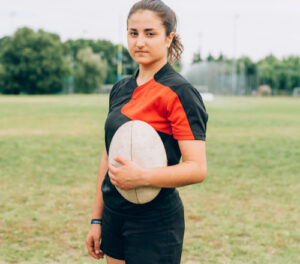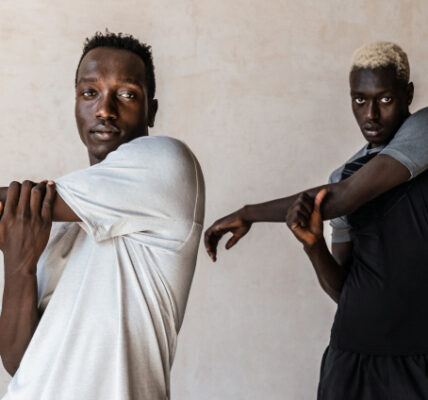There’s something unspoken in the way the Springbok Women walk out onto the field. Not bravado, not showmanship, something older, heavier. A kind of quiet steel that comes from knowing you’re playing not just for a win, but for notice. For acknowledgement. For the right to be taken seriously in a game that hasn’t always made space for you. On a misty afternoon in Cape Town, that steel was on full display. The Black Ferns XV arrived with reputation. The Springbok Women, with intention. And though the result went the way most expected, the story unfolding between the collisions was not about scorelines. It was about defiance. About making space where there is none, and filling it with something unignorable.
The game itself was brutal. The kind of physicality that leaves players marked for days and reshapes how a crowd holds its breath. But what stood out wasn’t just the hit count or the tactical shifts, it was the character. Babalwa Latsha, captain and cornerstone, moved through the phases like someone who’s had to fight for every minute on that field. Every carry, every ruck, every time her name is called isn’t just about the game, it’s a result of years clawing through a system that offered her little and asked her for everything. You could see it on her face, this was not just a test match, it was proof of life.
The supporters in the stands knew it, too. Many were first-time spectators of women’s rugby, dragged along by curiosity or the word-of-mouth pride that travels fast in South Africa when something authentic begins to stir. The applause didn’t feel performative. It felt surprised, maybe even a little ashamed. Because anyone watching closely could see that these players weren’t asking for charity, they were demanding to be seen. Their tackles were clean, their structure organised, their resolve unmistakable. And in the middle of it all, there was a kind of grief, an understanding that this level of commitment has existed for years, mostly in the shadows.
Cape Town doesn’t always show up for its own. But on that Saturday, under the open sky, it did. Not in mass numbers, but in something more important, intention. Young girls sat in the stands, not with painted faces or vuvuzelas, but with narrowed eyes and upright posture. Watching closely. Learning how to carry yourself when the odds are built into the system. Learning how not to flinch. In a country that sells dreams in the form of male Springbok jerseys, the idea that those girls might now dream of something different, or more, is not a side effect, it’s the point.
The coaches on the sideline didn’t shout much. They didn’t need to. The tone of the match wasn’t driven by technical demands, it was carried by emotional momentum. Every line break, every turnover, felt earned in blood. The players weren’t coasting on talent, they were working for every inch. That’s what happens when your place in the game isn’t guaranteed. You don’t play safe. You play like it matters because it does.
In the build-up to this match, the Springbok Women had already faced off against Canada, a side ranked several tiers above them. The results hadn’t gone their way, but they walked off those fields bruised but proud. There’s something happening in this team that doesn’t fit the traditional arc of success. They are building something under the weight of being under-resourced, under-reported, and too often underestimated. But they are building it anyway.
That kind of persistence doesn’t come from corporate backing or TV deals. It comes from early mornings at training grounds with no grass, from shared boots and side jobs. It comes from teammates who don’t just play together but survive together. Who tape each other’s injuries and pick each other off the ground when the whistle blows. Rugby is a brutal game. But what the Springbok Women are showing is that brutality, when carried with dignity, becomes something else entirely. It becomes testimony.
 After the match, some of the players stayed back on the field, speaking with young fans, posing for photos, exchanging short words that meant more than they sounded. You could see the fatigue in their bodies. The ice packs had started to come out, the strapping peeled away. But none of them left early. Because this, this aftermath, this contact between those who play and those who are learning to believe, is just as vital as anything that happens in the 80 minutes prior. It’s where identity begins to shift.
After the match, some of the players stayed back on the field, speaking with young fans, posing for photos, exchanging short words that meant more than they sounded. You could see the fatigue in their bodies. The ice packs had started to come out, the strapping peeled away. But none of them left early. Because this, this aftermath, this contact between those who play and those who are learning to believe, is just as vital as anything that happens in the 80 minutes prior. It’s where identity begins to shift.
Somewhere beyond the stadium, a few blocks away, life carried on as usual. But in a small lounge at the Goldrush Casino in Goodwood, a group of rugby fans replayed the match. Not the men’s game, but this one. They sat around a table between rounds of electronic bingo, discussing lineouts and breakdowns, talking about players by name. That in itself is a change. That in itself is a crack in the old ceiling. When people talk about the game in places where the game wasn’t even mentioned before, something real is happening.
Women’s rugby in South Africa is not a novelty. It is not an experiment. It is not a future waiting to arrive, it is present, living, bruised, proud, and already writing its own history. The Springbok Women don’t need rescue or celebration. They need recognition. And more than that, they need infrastructure. They need full-time contracts, media coverage, development pathways, and facilities that don’t ask them to be grateful for the bare minimum.
The match in Cape Town was a reminder. That the game belongs to all who honour it. That playing with less does not mean offering less. That talent has never been the issue, access has. And as the echoes of that day linger through the alleyways and lounges of Cape Town, as fans return to work and school and replay the hits in their minds, the image of those women in green jerseys, heads high and hands dirty, remains. They weren’t just holding their ground. They were expanding it. Quietly, relentlessly, together.
There will be more matches. More challenges. More moments where they are expected to fail. But if you watched them that day, even just for a few minutes, you’d know the truth. They’re not going anywhere. They’ve arrived. And they’re standing tall.




